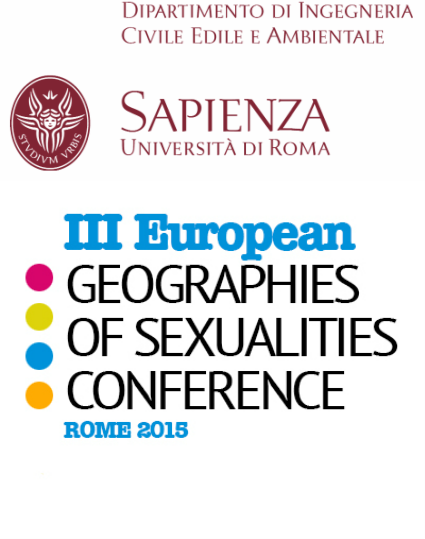Session title: "The changing spaces of LGBT activism: between spectacle and media, identies and equalities"
Organizers: Pierpaolo Mudu (University of Washington - Tacoma), Stefano Bettani (University of Washington - Seattle), Michael Brown (University of Washington - Seattle) and Larry Knopp (University of Washington - Tacoma)
The aim of this session is to discuss changes over time in oppositional practices by LGBT activists. After the ‘human rights turn’ of the LGBT movements in the early 1990s, political successes and failures have ensued (Kollman and Waites, 2009). One the one hand, activism has gone global and in different countries a similar repertoire of actions has been adopted; on the other hand, the specificities of places have produced divergent activist LGBT practices.
LGBT movements have been criticized for failing to articulate a universal vision for social change because of a reliance on fixed identity categories (Bernstein, 2002). Furthermore most of the efforts of LGBT movements have been devoted to legal equality strategies, particularly marriage law reform and anti-discrimination laws (Spade, 2011).
This session focuses on critical reflections on current LGBT political trends (see for example: Heckert, 2004; Brown, 2012). Topics that are welcome include but are by no means limited to:
- critical reflections on the evolution of LGBT activism;
- the evolution of organizations that originated before the 1990s
- the usefulness of conceptual binaries in activism such as assimilation versus separatism and radicalism versus liberalism;
- alternative approaches to identity politics in LGBT movements;
- new forms of queer resistance;
- the ways in which LGBT activism has contrasted or promoted homonormativity;
- the role of new media and social networking mobilizing activists.
References
Bernstein M. (2002). Identities and politics: Toward a historical understanding of the lesbian and gay movement. Social Science History, 26(3), 531–581.
Brown G (2007) Mutinous eruptions: autonomous spaces of radical queer activism.Environment and Planning A, 39(11): 2685 – 2698
Brown G. (2012). Queer’s contradictions (and radical sexual politics for precarious times). Issue 03 : ...ment Journal.
Dubrow, G., Knopp, L. and Brown, M. (2015). Act Up Versus Straighten Up: Public Policy and Queer Community-Based Activism. In Petra L. Doan (ed.), 2015, Planning and LGBTQ Communities: The Need for Inclusive Queer Spaces, pp. 202–216. New York: Routledge
Kollman K., Waites M. (2009). The global politics of lesbian, gay, bisexual and transgender human rights: An introduction. Contemporary Politics, 15(1), 1-17.
Heckert J. (2004) Sexuality/Identity/Politics. Purkis J., Bowen J. (eds) Changing Anarchism. Manchester: Manchester University Press, 101–116.
Mudu P. (2002) Repressive tolerance: The Gay Movement and the Vatican in Rome. Geojournal, Vol. 58, issue 2-3: 189-196.
Spade D. (2011). Normal life: Administrative violence, critical trans politics, and the limits of law. Brooklyn, NY: South End Press.
To submit an abstract (around 250 words) and for informal inquiries, please send an email to: [email protected], [email protected], [email protected] and [email protected]
Deadline for the submission of abstracts: 7 May 2015.
Organizers: Pierpaolo Mudu (University of Washington - Tacoma), Stefano Bettani (University of Washington - Seattle), Michael Brown (University of Washington - Seattle) and Larry Knopp (University of Washington - Tacoma)
The aim of this session is to discuss changes over time in oppositional practices by LGBT activists. After the ‘human rights turn’ of the LGBT movements in the early 1990s, political successes and failures have ensued (Kollman and Waites, 2009). One the one hand, activism has gone global and in different countries a similar repertoire of actions has been adopted; on the other hand, the specificities of places have produced divergent activist LGBT practices.
LGBT movements have been criticized for failing to articulate a universal vision for social change because of a reliance on fixed identity categories (Bernstein, 2002). Furthermore most of the efforts of LGBT movements have been devoted to legal equality strategies, particularly marriage law reform and anti-discrimination laws (Spade, 2011).
This session focuses on critical reflections on current LGBT political trends (see for example: Heckert, 2004; Brown, 2012). Topics that are welcome include but are by no means limited to:
- critical reflections on the evolution of LGBT activism;
- the evolution of organizations that originated before the 1990s
- the usefulness of conceptual binaries in activism such as assimilation versus separatism and radicalism versus liberalism;
- alternative approaches to identity politics in LGBT movements;
- new forms of queer resistance;
- the ways in which LGBT activism has contrasted or promoted homonormativity;
- the role of new media and social networking mobilizing activists.
References
Bernstein M. (2002). Identities and politics: Toward a historical understanding of the lesbian and gay movement. Social Science History, 26(3), 531–581.
Brown G (2007) Mutinous eruptions: autonomous spaces of radical queer activism.Environment and Planning A, 39(11): 2685 – 2698
Brown G. (2012). Queer’s contradictions (and radical sexual politics for precarious times). Issue 03 : ...ment Journal.
Dubrow, G., Knopp, L. and Brown, M. (2015). Act Up Versus Straighten Up: Public Policy and Queer Community-Based Activism. In Petra L. Doan (ed.), 2015, Planning and LGBTQ Communities: The Need for Inclusive Queer Spaces, pp. 202–216. New York: Routledge
Kollman K., Waites M. (2009). The global politics of lesbian, gay, bisexual and transgender human rights: An introduction. Contemporary Politics, 15(1), 1-17.
Heckert J. (2004) Sexuality/Identity/Politics. Purkis J., Bowen J. (eds) Changing Anarchism. Manchester: Manchester University Press, 101–116.
Mudu P. (2002) Repressive tolerance: The Gay Movement and the Vatican in Rome. Geojournal, Vol. 58, issue 2-3: 189-196.
Spade D. (2011). Normal life: Administrative violence, critical trans politics, and the limits of law. Brooklyn, NY: South End Press.
To submit an abstract (around 250 words) and for informal inquiries, please send an email to: [email protected], [email protected], [email protected] and [email protected]
Deadline for the submission of abstracts: 7 May 2015.

